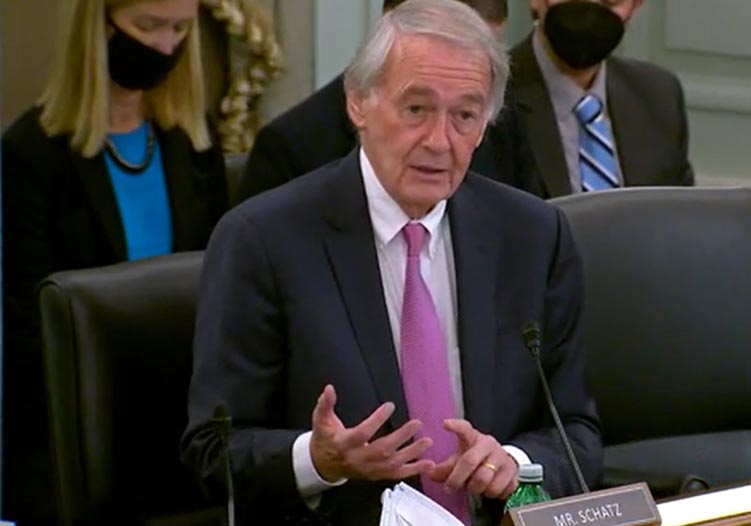Sen. Markey Will Introduce Bill to Reclassify Broadband Under Title II
Said he wants to end regulatory ping-pong game once and for all

The smarter way to stay on top of the multichannel video marketplace. Sign up below.
You are now subscribed
Your newsletter sign-up was successful
Sen. Ed Markey (D-Mass.) plans to introduce legislation to reclassify broadband as a Title II service, which would subject it to common-carrier rules, restore the Federal Communication Commission‘s oversight of broadband access and reverse the Republican FCC‘s elimination of net neutrality rules.
If Democrats want a legislative net neutrality rule restoration they may have to get it done before the 2022 midterms and a potential reversal of political fortunes.
Markey said during Wednesday‘s (Nov. 17) renomination hearing for FCC acting chairperson Jessica Rosenworcel that he intended on introducing a bill to “end this ping-pong between administrations“ and make it explicit that broadband is a Title II service. Currently it is classified as a Title I information service not subject to common-carrier regulations.
Also: FCC’s Rosenworcel Pledges to Re-Examine Video Programming Marketplace
Markey said he hoped that the reclassification could be done on a bipartisan basis but also recognizes that is almost certainly a nonstarter, adding, “Perhaps that will not be the case.”
Earlier in the hearing, Sen. John Thune (R-S.D.) had said he also supported a legislative fix. Some Republicans in both the House and Senate have supported restoring net neutrality rules legislatively, just definitely not under Title II common-carrier rules that they fear could morph into mandatory access and rate regulation.
During the hearing, Rosenworcel said she still supported net neutrality rules and when pressed by Title II-backed rules opponent Sen. Roger Wicker (R-Miss.), said she would provide him with examples of how the lack of such rules hurt consumers. Wicker and others have pointed to NCTA data showing how much better the U.S., with the investment boost it argued came after the net neutrality rules were rolled back, handled the pandemic-driven broadband load versus some European countries with net neutrality rules.
Rosenworcel said the FCC always had to look at the investment record, but that the implication of the rules rollback were broader, including taking broadband oversight away from the FCC and how the pandemic demonstrated how vital broadband was, and so also how important it was to have some oversight.
But when asked by Thune whether she would commit to seeking advice from Congress before doing anything on net neutrality rules, Rosenworcel would make no such promises. She said the FCC had the authority to restore the rules. She said that if it did look to do that it would need to take into account the increased importance of broadband in the pandemic. She did pledge to work with the committee.
Markey asked her specifically if she supported reclassifying broadband as a Title II service (which subjects it to common carrier rules including mandatory access), she appeared to say yes though Markey asked if she supported reinstating net neutrality rules and restoring Title II classification and she said, “Yes, I support net neutrality.’
Markey said if his bill did not make pass, he agreed the FCC had the authority to restore Title II, though of course that would mean yet another volley of that ping-pong ball that could come back as Title I once again in a future Republican Administration. ■
The smarter way to stay on top of the multichannel video marketplace. Sign up below.
Contributing editor John Eggerton has been an editor and/or writer on media regulation, legislation and policy for over four decades, including covering the FCC, FTC, Congress, the major media trade associations, and the federal courts. In addition to Multichannel News and Broadcasting + Cable, his work has appeared in Radio World, TV Technology, TV Fax, This Week in Consumer Electronics, Variety and the Encyclopedia Britannica.

